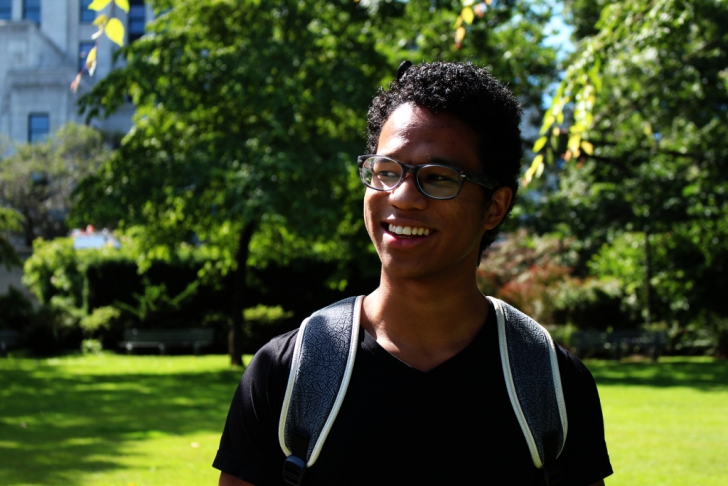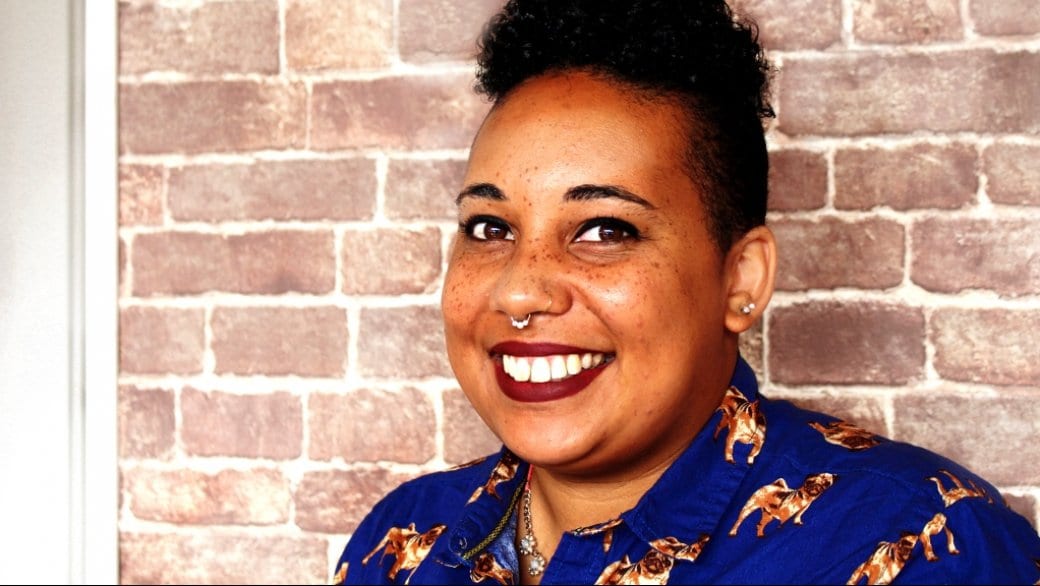When Cicely-Belle Blain first heard the suggestion to launch a Black Lives Matter chapter in Vancouver, she hesitated.
In a city where black people make up less than one percent of the population, she was concerned they wouldn’t find enough support.
“At first we we were like, ‘No, there’s really such a small black population,’” she says, while sipping tea in a Mount Pleasant café. “Doing activist work, numbers are so important.”
Blain is queer and black. She grew up in London, UK, and moved to Vancouver to attend the University of British Columbia. Now graduated, she says she’s been hired for her dream job as a queer youth worker.
In April 2016, she and a friend created a Facebook page for Black Lives Matter Vancouver. It was a litmus test of whether Vancouver was open to the idea. When the results came in on social media, Blain says her initial doubts dissolved: within three days the page received more than 1,000 likes, and a GoFundMe campaign brought in upwards of $1,000 in donations.
Since then, Blain has been involved as one of the primary organizers of the Vancouver Black Lives Matter chapter.
The group has been embraced by many advocacy organizations across the city, and in June and July held well-attended vigils after the shootings in Orlando and the police killings of two black men in Louisiana and Minnesota.
On July 8, the Vancouver Dyke March announced that Black Lives Matter will lead its July 30 march in East Vancouver, and the Queer Film Festival released its schedule, which includes co-hosting a Black Lives Matter dance party on Aug 18.
Black Lives Matter is gathering a contingent of queer people of colour to help them lead the Vancouver Dyke March on July 30, 2016, says Cicely-Belle Blain. (Tessa Vikander/Daily Xtra)
Founded in 2013 by Alicia Garza, Opal Tometi and Patrisse Cullors, the Black Lives Matter movement says it seeks to address anti-black racism. It emerged as a response to police brutality and during the protests that followed the killing of Trayvon Martin, a 17-year-old black Florida resident. When his killer, George Zimmerman, was acquitted of second degree murder, activists across the continent took to the streets.
In Canada, the Black Lives Matter movement has made both headway and headlines over the past six months. Starting in March, members of the Toronto chapter camped outside of the city’s police headquarters for several weeks, protesting a decision to not press charges in the shooting death of Andrew Loku.
Then, after Black Lives Matter Toronto accepted an invitation to lead Toronto’s Pride parade, the group disrupted the event with a sit-in. In a call to fully support black, indigenous, non-white LGBT people and to remove police floats from Pride, Black Lives Matter Toronto stopped the parade in its tracks.
They agreed to let the parade continue only after Pride Toronto signed a document agreeing to their demands. It was a demonstration that raised backlash from some, and solidarity from others.
“I was so happy, I actually almost cried,” Blain says. “It was such a profound and powerful act.”
For Vancouver’s upcoming Dyke March, Blain says Black Lives Matter is gathering a contingent of queer people of colour who will help them lead the march. The group was originally invited to participate a few months ago, and Dyke March organizers say both the shootings in Orlando and the intervention at Toronto’s Pride parade spurred them to ask Black Lives Matter to now lead the march.
“With the recent events in Orlando and Toronto, we think it’s more important than ever to make sure our spaces here in Vancouver are open and welcoming to trans, queer, black and indigenous folks, people of colour,” board member Christine Osgood tells Daily Xtra in a phone interview.

“Sometimes it’s easy to forget that your voice still matters,” says Black Lives Matter member Guy Noah. (Tessa Vikander/Daily Xtra)
The founding members of the Black Lives Matter movement are queer, and both Toronto and Vancouver’s chapters reflect these roots. Guy Noah is another queer member of the Vancouver collective.
Growing up in Mission with nine siblings, Noah says his father taught him about racism from a young age. But in the classroom where he was the only non-white student, Noah recalls that conversations about race and racism were deemed inappropriate.
Now an English Literature student at UBC, Noah says some instructors have managed to create an environment where he feels supported to speak up. And while he doesn’t fear for his life while on the street, he says the spaces where he feels accepted and understood are few and far between.
“I think the experience of being black in Vancouver is a continuous experience of feeling out of place, of feeling under-represented, of feeling invisible, of feeling like simply because you don’t see yourself in a crowd, sometimes it’s easy to forget that your voice still matters,” he tells Daily Xtra.
Noah mentions gratitude frequently and speaks enthusiastically about organizing for solidarity and visibility around black communities.
“Because of the way that I talk, people like to erase my blackness with comments of like ‘oh my god, you’re not even black . . . you’re the whitest black person I know,’” he says.
As a queer black man, he says people tend to assume that he’s meek and submissive. Men in particular, he says, are often combative with him in conversation.

Black Lives Matter Toronto led the Toronto Pride parade on July 3, 2016. (Nick Lachance/Daily Xtra)
Black Lives Matter Vancouver say they won’t be participating in the city’s Pride parade.
“The Dyke March responded positively to the recent events in Toronto and, with compassion and dignity, have invited BLM-Vancouver to lead as Grand Marshall this year as part of their contribution to Pride,” the group says in a statement posted July 15 to its Facebook page.
“We have responded to that positive message of solidarity and humanity and are pleased to be involved with several other QTBIPoC-centred events as well,” the statement says.
“We do this not only because we feel that Pride no longer represents community action, resistance and revolution but also as an act of solidarity with BLM chapters across North America to whom Pride parades have been made inaccessible.”
It’s a position that both Noah and Blain say they stand behind and even as individuals they won’t attend.
On July 12, the Vancouver Pride Society released a statement of its own saying it’s “deeply committed to understanding our role in creating safer spaces for trans people, Indigenous communities and people of colour through the Pride season and throughout the year.”
“That is why we continue to reach out to groups that reflect these populations with the intention of honest and respectful dialogue regarding inclusion, belonging, cultural safety and how individuals who experience intersectionality are included with more intention in the Vancouver Pride Society and our events,” the statement says.
“This includes reaching out to Black Lives Matter Vancouver after the Toronto Pride parade,” it adds.
VPS vice president Charmaine de Silva says Pride posted the statement in response to questions from the community about whether it had a relationship with Black Lives Matter Vancouver, and whether it would ban police floats in the parade.
“We’d like to open up the lines of communication and we want to know what we can do,” de Silva tells Daily Xtra in a phone interview on July 14.
But according to Blain and Noah, Black Lives Matter Vancouver didn’t receive the message. In fact, Blain says the VPS’s public statement on Black Lives Matter was the most she’d heard from them.
When Xtra asked de Silva about the discrepancy, she said a VPS board member had sent Black Lives Matter an email.
When Xtra called Blain back later that evening, she said she had just received an email from the Vancouver Pride Society.
Blain says Black Lives Matter is now open to dialogue with the VPS.

“If there is a time to get involved, it’s now,” says Black Lives Matter member Joy Gyamfi. (Tessa Vikander/Daily Xtra)
Meanwhile, Black Lives Matter members are gearing up for their role in the Dyke March. In addition to the core organizing collective, Black Lives Matter is bolstered by about 25 members. Joy Gyamfi, a queer and black UBC student, is among them.
“If there is a time to get involved, it’s now,” she says.
“It’s really exciting that we get to lead the march,” she continues.
“I think a lot of Pride events are still very focused on whiteness and liberalness and they’re not really focused on POCs and black people,” she says, “and it’s hard for me to go to those events.”
Having lived in Metro Vancouver her whole life, Gyamfi says she never felt part of a black community, until now. Aside from when she’s with her friends, Gyamfi says the Black Lives Matter collective is the only space where she feels embraced for exactly who she is.
“I feel accepted in Black Lives Matter. . . we have queer members in there, that was like one of my worries when I first joined,” she says.
Now, she says, when she’s in Black Lives Matter spaces or with certain friends, “I feel completely and wholly accepted.”

 Why you can trust Xtra
Why you can trust Xtra


